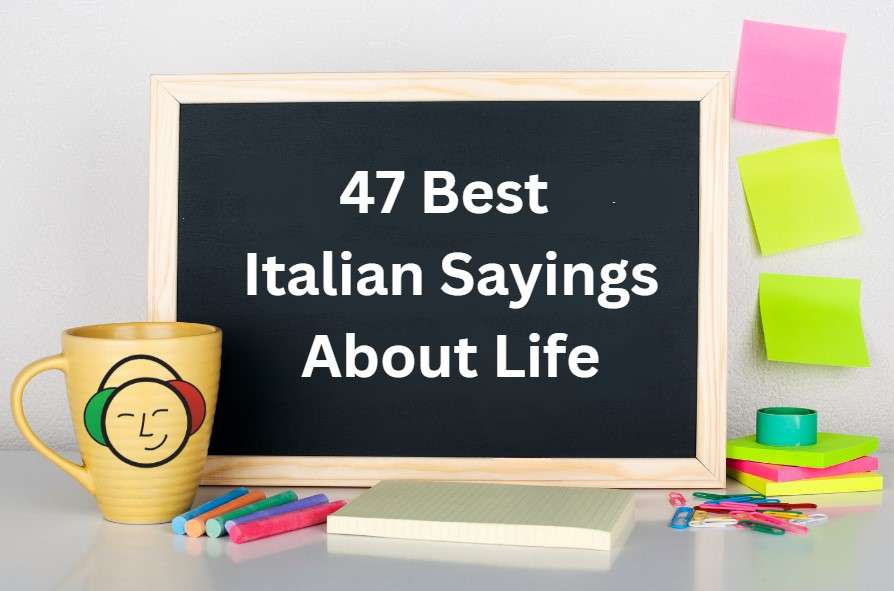47 Best Italian Sayings About Life: Proverbs & Quotes
When exploring the Italian language, it’s impossible not to stumble upon a wealth of Italian sayings about life passed down through generations.
These Italian sayings, quotes, and proverbs are not just words but a window into Italian culture’s heart. They reflect the values and beliefs that have shaped how Italians view the world and go about their everyday lives.
The Italian language is rich with expressions that can teach us valuable lessons about life, love, and friendship. For language learners and anyone looking to deepen their understanding of Italy and its people, familiarizing oneself with these best Italian quotes about life is essential.
47 Best Italian Sayings, Proverbs, and Quotes About Life

This collection of the 47 best Italian sayings about life (with English translation) will give you an authentic glimpse into the Italian way of thinking and offer a deeper appreciation of the beauty and wisdom found within Italian culture.
1. Ambasciator non porta pena
“Don’t shoot the messenger.” This phrase conveys that someone delivering bad or unpleasant news on behalf of others isn’t responsible for the information and shouldn’t be blamed.
2. Cane che abbaia non morde
The literal translation of this saying is: “A barking dog doesn’t bite.” It means those who make many threats often don’t follow through with them.
3. Fidarsi è bene ma non fidarsi è meglio
“Trust is good, but being cautious is better.” This saying emphasizes that while trust is vital in life, it’s wise not to be overly naive; extra care can save you from trouble.
4. Chi si volta, e chi si gira, sempre a casa va finire
“No matter where you turn or roam, you’ll always end up at home.” This expression serves as a reminder that no matter how far we wander or explore, we will eventually find our way back to our roots or familiar surroundings.
It highlights the importance of home and the comfort it provides, even as we journey through life’s many twists and turns.
5. Finché c’è vita, c’è speranza
“As long as there’s life, there’s hope” This expression encourages us to never lose hope, even in challenging situations. It’s occasionally used sarcastically for those who persist in hoping when it seems pointless.
6. Non si può avere la botte piena e la moglie ubriaca
“You can’t have a barrel full of wine and a drunk wife simultaneously.” This expression is a reminder that sometimes you must sacrifice one thing to gain another, as you can’t always have everything you want at once.
7. Chi nasce tondo non può morir quadrato
“Those who are born round can’t die square.” This saying implies that breaking bad habits is difficult and changing them can be nearly impossible.
8. A caval donato non si guarda in bocca
“Don’t look a gift horse in the mouth.” This phrase advises us not to criticize what we’ve been given. It originates from horse traders inspecting a horse’s teeth to determine its health before purchasing.
9. L’abito non fa il monaco
“You can’t judge a book by its cover.” This Italian proverb cautions against making assumptions based on appearances alone, as they can often be misleading. It encourages us to look beyond the surface and get to know people or situations more deeply before forming judgments.
10. Il fine giustifica i mezzi
“The end justifies the means.” This proverb implies that if the goal is noble, one shouldn’t worry about the means or methods used to achieve it.
11. Meglio tardi che mai
“Better late than never.” This widely-known Italian saying encourages people to take action, even if they are delayed or behind schedule. It reminds us that it’s better to complete something or make progress, even if it’s later than initially planned, than never to do it at all.
12. Le bugie hanno le gambe corte
“Lies have short legs.” This expression advises against lying, as lies can’t travel far or last long, ultimately causing more harm than good.
13. Ogni lasciata è persa
“Everything left is lost.” This proverb encourages seizing opportunities when they arise rather than hesitating or delaying, as missed chances are often gone forever.
14. Parlare come un libro stampato
“To speak like a printed book” refers to someone who uses language correctly and appropriately, just as a book would.
15. Piove sempre sul bagnato
“It always rains on the wet.” This saying has both positive and negative connotations. In English, it’s similar to “when it rains, it pours,” implying that misfortune tends to follow the unlucky. In Italian, it also suggests that those who’ve experienced good fortune will continue to enjoy it.
16. Occhio non vede, cuore non duole
“What the eye doesn’t see, the heart doesn’t grieve.” This proverb implies that if you’re unaware of something undesirable, you won’t suffer from it.
17. La notte porta consiglio
“Night brings advice.” This saying suggests it’s wise to sleep on challenging decisions and make choices with a clear mind in the morning.
18. O mangi questa minestra o salti questa finestra
“Either eat this soup or jump out of this window.” This Italian expression emphasizes that sometimes we have limited options and must choose between accepting the situation as it is or facing the consequences.
It’s a reminder that, at times, we have to make tough decisions and that not every situation offers a perfect solution.
19. Chi si fa i fatti suoi campa 100 anni
“Who wants to live longer should mind his own business.” This saying suggests that staying out of other people’s affairs leads to a happier and longer life.
20. Paese che vai usanze che trovi
“Every country you visit has different customs.” This saying promotes tolerance and understanding of other cultures and is the Italian equivalent of “When in Rome, do as the Romans do.”
21. Meglio soli che male accompagnati
“Better alone than in bad company.” This saying can be applied to situations where one might hesitate to do something alone. It suggests it’s better to be alone or tackle a task independently than with someone who might negatively impact your life or work.
22. De gustibus non disputandum est
“Tastes differ.” Hailing from Latin, this saying reminds us that everyone is unique and possesses different preferences. We should respect and be tolerant of others’ feelings and inclinations.
Related Reading: 10 Famous Latin Quotes and Meanings
23. Tentar non nuoce
“There’s no harm in trying.” This expression emphasizes the importance of solving problems; valuable lessons can still be learned even if the attempt fails.
24. L’ospite è come il pesce dopo tre giorni puzza
“A guest is like a fish that, after three days, stinks.” This humorous proverb acknowledges that while we enjoy having good friends and family members around, it can become overwhelming if they stay for too long.
25. Non dire gatto se non ce l’hai nel sacco
“Don’t say cat if you don’t have it in the bag.” This is the Italian version of the English proverb “Don’t count your chickens before they hatch,” this popular Italian saying advises against relying on something hoped for until you are certain it will happen.
26. Una buona giornata comincia al mattino
“A good day starts in the morning.” This saying highlights the significance of starting each day positively, setting the tone for the rest of the day.
27. Chi ben comincia è a metà dell’opera
“He who begins well is half done.” This expression emphasizes the importance of starting tasks with determination and focus, as a strong beginning lays the foundation for successful completion.
28. L’erba del vicino è sempre più verde
“The grass isn’t always greener on the other side.” A common saying in many languages, this proverb reminds us that we often believe others are in a better situation than ourselves, even if that’s not true.
29. Mal comune mezzo gaudio
“Shared trouble, shared joy.” This proverb encourages sharing your problems with others, as doing so can make them seem less daunting—a trouble shared is a trouble halved.
30. Troppi cuochi guastano la cucina
“Too many cooks spoil the broth.” Just as having multiple chefs in the kitchen can lead to chaos, involving an excessive number of people in a single task without proper communication can result in confusion and conflicting instructions.
31. Chi ha tempo non aspetti tempo
“Who has time, shouldn’t wait for time.” This expression urges people to stop procrastinating and tackle tasks today instead of putting them off until tomorrow.
32. Il mattino ha l’oro in bocca
“The morning has gold in its mouth.” This proverb encourages people to start their day early and make the most of it. It implies that beginning your day early can lead to greater rewards. Embracing this mindset is essential to Italian culture, as it urges people to capitalize on their time and opportunities.
33. Chi va piano, va sano e va lontano
“He who goes slowly, goes safely and goes far.” This proverb promotes patience and perseverance when dealing with life’s challenges. It reminds us that taking time to do things correctly will result in long-term success.
34. Mangia bene, ridi spesso, ama molto
“Eat well, laugh often, love much.” This delightful Italian saying emphasizes the importance of enjoying life’s simple pleasures.
It encourages us to nourish our bodies with good food, fill our lives with laughter, and cherish the love of those around us. We can experience a fulfilling and joyful life by embracing these three essential elements.
35. Forza e coraggio che la vita è un passaggio
“Strength and courage, for life is a passage.” This Italian saying serves as a reminder to face life’s challenges with resilience and determination. It emphasizes that life is a journey full of ups and downs, and we must remain strong and courageous throughout the various stages and experiences we encounter.
36. Ride bene chi ride ultimo
“He who laughs last laughs best.” This is one of the most used Italian sayings about life, conveying that true victory is often determined at the end of a situation rather than by initial appearances.
It serves as a reminder to stay patient and persistent, as those who endure hardships and maintain a sense of humor will ultimately triumph.
37. Ogni scarrafone è bello a mamma soja
“Every cockroach is beautiful to its mother.” This expression describes someone excessively proud of their creations, no matter how flawed they may be. It serves as a reminder to maintain objectivity and honesty when evaluating one’s work.
Related Reading: 10 Italian Mother’s Day quotes that will touch your heart.
38. Chi dorme non piglia pesci
“Those who sleep don’t catch fish.” This well-known Italian proverb serves as a reminder that success requires effort and staying proactive. It emphasizes the importance of staying alert and seizing opportunities that life presents. By remaining focused and taking action, you can achieve your goals.
39. Tra il dire e il fare c’è di mezzo il mare
“Talk is cheap.” Believed to have originated in the 16th century, this saying encourages people not to talk about something but to take action merely. It implies that actions speak louder than words and that supporting our words with action is crucial.
40. L’appetito vien mangiando
“Appetite comes with eating.” Italians use this saying to express how motivation and enthusiasm can grow as one engages in an activity. It reminds us to keep pushing forward and be open to trying new things.
41. A volte non si può avere tutto
“Sometimes you can’t have it all.” This saying reminds us that we cannot always obtain everything we desire and must sometimes make sacrifices or compromises.
42. La vita è fatta a scale: c’è chi scende e c’è chi sale
“Life is like a staircase: some go up, and some go down.” This Italian saying portrays life as a continuous series of ups and downs, emphasizing that everyone experiences successes and failures.
It reminds us to accept the natural flow of life, understand that we will face both good and bad times, and remain resilient through it all.
43. Chi non lavora, non fa l’amore
“He who does not work does not make love.” This popular Italian proverb about life encourages people to stay productive and motivated. It serves as a reminder that hard work is essential for success in all areas of life, including relationships.
44. Chi trova un amico, trova un tesoro
He who finds a friend finds a treasure.” This saying highlights the importance of friendship in Italian culture and emphasizes the value of having supportive people in your life. It acknowledges that true friends are invaluable and should be cherished.
45. Chi non risica non rosica
“He who does not risk does not get the rose.” This Italian proverb encourages people to take risks and be courageous in uncertainty. It reminds us to seize opportunities without fearing failure.
46. Chi troppo vuole nulla stringe
“Grasp all, lose all.” This Italian proverb cautions against excessive greed and trying to achieve too much at once. It reminds us that focusing on too many goals or desires can ultimately lead to failure, and it’s better to concentrate on a few meaningful pursuits to achieve success.
47. Non tutto quel che luccica è oro
“All that glitters is not gold.” This is one of the most common Italian sayings about life. It cautions against being deceived by appearances, as not everything that seems valuable or attractive may be genuine or worthwhile.
The Importance of Embracing Italian Sayings, Quotes, and Proverbs in Appreciating Italian Culture

The Italian sayings about life we’ve explored are more than just expressions; they are a testament to the values and beliefs at the core of Italian culture, influencing everyday life in Italy.
These sayings have been passed down through generations, providing insight into how Italians approach life, love, and friendship, not only on special occasions but also in their daily interactions.
English speakers who take the time to learn these sayings will gain a deeper appreciation for the rich heritage and cultural nuances that make Italy so unique.
Remember, it’s not just about learning the words; it’s about embracing the underlying philosophy and wisdom they convey. So, as you continue your journey into the Italian language and culture, don’t forget to carry these Italian sayings about life with you.
They will enrich your experience and help you understand and appreciate Italian culture’s beauty, depth, and wisdom.
Recommended Reading:
- How to Say Please in Italian: 10 Common Ways (with Audio).
- How to Say I Love You in Italian: Express Your Amore!







